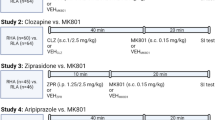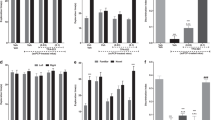Abstract
Background
Atypical antipsychotic drugs have some efficacy in alleviating the negative and some cognitive symptoms of schizophrenia but those effects are small and mechanisms of this action are still unknown A few clinical reports have suggested that antidepressants (ADs), are able to augment the activity of atypical antipsychotic drugs. Thus, in the present study, we aimed to evaluate the effect of ADs, escitalopram (ESC) or mirtazapine (MIR) and aripiprazole (an atypical antipsychotic drug) given separately or jointly, on the MK-801-induced positive and cognitive symptoms of schizophrenia in mice.
Methods
The experiments were conducted on male Albino Swiss mice. ADs and aripiprazole were given 30 min before MK-801 injection. Locomotor hyperactivity induced by MK-801 (0.3 mg/kg) was measured for 30 min, starting 30 min after MK-801 administration. In the novel object recognition test, MK-801 (0.2 mg/kg) was given 30 min before the first introductory session. Memory retention was evaluated for 5 min, starting 90 min after the introductory session.
Results
Aripiprazole (0.3 mg/kg) reduced the locomotor hyperactivity induced by MK-801(0.3 mg/kg). Co-treatment with an inactive dose of aripiprazole and ESC or MIR inhibited the effect of MK-801. Moreover, MK-801 (0.2 mg/kg) decreased the memory retention. Aripiprazole (0.3 mg/kg) reversed that effect. Co-treatment with an inactive dose of aripiprazole and ESC or MIR abolished the deficit of object recognition memory induced by MK-801.
Conclusions
The obtained results suggest that ADs may enhance the antipsychotic-like effect of aripiprazole in the animal tests used for evaluation of some positive and cognitive symptoms of schizophrenia.
Similar content being viewed by others
References
Rőssler W., Salize HJ, van Os J, Riecher-Rőssler A. Size of burden of schizophrenia and psychotic disorders. Eur Neuropsychopharmacol 2005;15(4):399–409.
Pearlson GD. Neurobiology of schizophrenia. Ann Neurol 2000;48(4):556–66.
Nuechterlein KH, Barch DM, Gold JM, Goldberg TE, Green MF, Heaton RK. Identification of separable cognitive factors in schizophrenia. Schizophr Res 2004;72(1):29–39.
Neill JC, Barnes S, Cook S, Grayson B, Idris NF, McLean SL, et al. Animal models of cognitive dysfunction and negative symptoms of schizophrenia: focus on NMDA receptor antagonism. Pharmacol Ther 2010;128(3):419–32.
Conley RR, Ascher-Svanum H, Zhu B, Faries DE, Kinon BJ. The burden depressive symptoms in the long-term treatment of patients with schizophrenia. Schizophr Res 2007;90(1–3):186–97.
Mishara AL, Golberg TE. A meta-analysis and critical review of the effects of conventional neuroleptoc treatment on cognition in schizophrenia: opening a closed book. Biol Psychiatry 2004;55(10):1013–22.
Abbasi SH, Behpournia H, Ghoreshi A, Salehi B, Raznahan M, Rezazadeh SA, et al. The effect of mirtazapine add on therapy to risperidone in the treatment of schizophrenia: a double-blind randomized placebo-controlled trial. Schizophr Res 2010;116(2–3):101–6.
Cho SJ, Yook K, Kim B, Choi TK, Lee KS, Kim YW, et al. Mirtazapine augmentation enhances cognitive and reduced negative symptoms in schizophrenia patients treated with risperidone: a randomized controlled trial. Prog Neuropsychopharmacol Biol Psychiatry 2011;35(1):208–11.
Schilström B, Konradsson-Geuken A, Ivanov V, Gertow J, Feltmann K, Marcus MM, et al. Effects of S-citalopram, citalopram, and R-citalopram on the firing patterns of dopamine neurons in the ventral tegmental area, N-methyl-D-aspartate receptor-mediated transmission in the medial prefrontal cortex and cognitive function in the rat. Synapse 2011;65(5):357–67.
Marcus MM, Jardemark K, Malmerfelt A, Gertow J, Konradsson-Geuken Å, Svensson TH. Augmentation by escitalopram, but not citalopram or R-citalopram, of the effects of low-dose risperidone: behavioral, biochemical, and electrophysiological evidence. Synapse 2012;66(4):277–90.
Kamińska K, Rogóż Z. The effect of combined treatment with risperidone and antidepressants on the MK-801-induced deficits in the social interaction test in rats. Pharmacol Rep 2015;67(6):984–90.
Rogóż Z, Kamińska K. The effect of combined treatment with escitalopram and risperidone on the MK-801-induced changes in the object recognition test in mice. Pharmacol Rep 2016;68(1):116–20.
DeLeon A, Patel NC, Crismon ML. Aripiprazole, a comprehensive review of its pharmacology, clinical efficacy, and tolerability. Clin Ther 2004;26(5):649–66.
Jordan S, Koprivica V, Chen R, Tottori K, Kikuchi T, Altar A. The antipsychotic aripiprazole is a potent, partial agonist at the human 5-HT1A receptor. Eur J Pharmacol 2002;441(3):137–40.
Lawler CP, Prioleau C, Lewis MM, Mak C, Jiang D, Schetz JA, et al. Interaction of the novel antipsychotic aripiprazole (OPC-14597) with dopamine and serotonin receptor subtypes. Neuropsychopharmacology 1999;20(6):612–27.
Shapiro DA, Renock S, Arrington E, Chiodo LA, Liu LX, Sibley DR, et al. Aripiprazole, a novel atypical antipsychotic drug with a unique and robust pharmacology. Neuropsychopharmacology 2003;28(8):1400–11.
Zajdel P, Marciniec K, Maślankiewicz A, Grychowska K, Satała G, Duszyńska B, et al. Antidepressant and antipsychotic activity of new quinoline- and isoquinoline-sulfonamide analogs of aripiprazole targeting 5-HT1a/5-HT2a/5-HT7 and dopamine D2/D3 receptors. Eur J Med Chem 2013;60:42–50.
Taylor DM. Aripiprazole: a review its pharmacology and clinical use. Int J Clin Prac 2003;57(1):49–54.
Sánchez C, Berggvist PB, Brennum LT, Gupta S, Hogg S, Larsen A, et al. Escitalopram, the S-(+)-enantiomer of citalopram, is a selective serotonin reuptake inhibitor with potent effects in animal models predictive of antidepressant and anxiolytic activities. Psychopharmacology (Berl) 2003;167(4):353–62.
Croom KF, Perry CM, Plosker GL. Mirtazapine: a review of its use in major depression and other psychiatric disorders. CNS Drugs 2009;23(5):427–52.
Geyer MA, Ellenbroek B. Animal behavior models of the mechanisms underlying antipsychotic atypicality. Prog Neuropsychopharmacol Biol Psychiatry 2003;27(7):1071–9.
Rajagopal L, Massey BW, Huang M, Oyamada Y, Meltzer HY. The novel object recognition test in rodents in relative to cognitive impairment in schizophrenia. Curr Pharm Des 2014;20(31):5104–14.
King MV, Sleight AJ, Woolley ML, Topham IA, Marsden CA, Fone KC. 5-HT6 receptor antagonists reverse delay-dependent deficits in novel object discrimination by enhancing consolidation-an effect sensitive to NMDA receptor antagonism. Neuropsychopharmacology 2004;47(2):195–204.
de Lima MN, Laranja DC, Bromberg E, Roesler R, Schroder N. Pre- or post-training administration of the NMDA receptor blocker MK-801 impairs object recognition memory in rats. Behav Brain Res 2005;156(1):139–43.
Rogóż Z. Effect of combined treatment with mirtazapine and risperidone on the MK-801-induced changes in the object recognition test in mice. Pharmacol Rep 2013;65(6):1401–6.
Rogóż Z. The effect of co-treatment with mirtazapine and risperidone in animal models of the positive symptoms of schizophrenia in mice. Pharmacol Rep 2012;64(6):1567–72.
Javitt DC, Zukin SR. Recent advances in the phencyclidine model of schizophrenia. Am J Psychiatry 1991;148(1):1301–8.
Fejgin K, Safonov S, Pälsson E, Wass C, Engel JA, Svensson L, et al. The atypical antipsychotic, aripiprazole, blocks phencyclidine induced-disruption of prepulse inhibition in mice. Psychopharmacology 2007;191(2):377–85.
Snigdha S, Neill JC. Improvement of phencyclidine-induced social behavior deficits in tats: involvement of 5-HT1A receptors. Behav Brain Res 2008;187(2):489–94.
Snigdha S, Neill JC. Efficacy of antipsychotics to reverse phencyclidine-induced social interaction deficits in female rats -a preliminary investigation. Behav Brain Res 2008;187(2):489–94.
Bruins Slot LA, Kleven MS, Newman-Tancredi A. Effects of novel antipsychotics with mixed antagonist/5-HT1A agonist properties on PCP-induced social interaction deficits on the rat. Neuropsychopharmacology 2005;49(7):996–1006.
Nagai T, Murai R, Matsui K, Kamel H, Noda Y, Furukawa H, et al. Aripiprazole ameliorates phencyclidine-induced impairment of recognition memory through dopamine D1 and serotonin 5-HT1A receptors. Psychopharmacology 2009;202(1–3):315–28.
Vincent SL, Khan Y, Benes FM. Cellular colocalization of dopamine D1 and D2 receptors in the medial prefrontal cortex. Synapse 1995;19(2):112–20.
Li Z, Ichikawa J, Dai J, Meltzer HY. Aripiprazole, a novel antipsychotic drug, preferentially increases dopamine release in the prefrontal cortex and hippocampus in rat brain. Eur J Pharmacol 2004;493(1–3):75–83.
Diaz-Mataix L, Scorza MC, Bortolozzi A, Toth M, Celada P, Artigas F. Involvement of 5-HT1Areceptors in prefrontal cortex in the modulationof dopaminergic activity: role in atypical antipsychotic action. J Neurosc 2005;25(47):10831–43.
Zocchi A, Fabbri D, Heidbreder CA. Aripiprazole increases dopamine but not noradrenaline and serotonin levels in the mouse prefrontal cortex. Neurosci Lett 2005;387(3):157–61.
Bortolozzi A, Diaz-Mataix L, Toth M, Celada P, Artigas F. In vivo action of aripiprazole on serotonergic and dopaminergic systems in rodent brain. Psychopharmacology 2007;191(3):745–58.
Ichikawa J, Ishii H, Bonaccorso S, Fowler WL, O’Laughlin IA, Meltzer HY. 5-HT2A and D2 receptor blockade increases cortical DA release via 5-HT1A receptor activation: a possible mechanism of atypical antipsychotic-induced cortical dopamine release. J Neurochem 2001;76(5):1521–31.
Javitt DC. Glutamate and schizophrenia: phencyclidine, N-methylo-D-aspartate receptors, and dopamine- glutamate interactions. Int Rev Neurobiol 2007;78:69–108.
Thierry AM, Blance G, Sobel A, Stinus L, Golwinski J. Dopaminergic terminals in the rat cortex. Science 1973;182(4111):499–501.
Horacek J, Bubenikova-Valesowa V, Kopecek M, Palenicek T, Dockery C, Mohr P, et al. Mechanism of action of atypical antipsychotic drugs and the neurobiologyof schizophrenia. CNS Drugs 2006;20(5):389–409.
Abekawa T, Ito K, Nakagawa S, Nakato Y, Koyama T. Effect of aripiprazole and haloperidol on progression to schizophrenia-like behavioural abnormalities and apoptosis in rodents. Schizophr Res 2011;125(1):77–87.
Author information
Authors and Affiliations
Corresponding author
Rights and permissions
About this article
Cite this article
Rogóż, Z., Wąsik, A. & Lorenc-Koci, E. Combined treatment with aripiprazole and antidepressants reversed some MK-801-induced schizophrenia-like symptoms in mice. Pharmacol. Rep 70, 623–630 (2018). https://doi.org/10.1016/j.pharep.2018.02.022
Received:
Revised:
Accepted:
Published:
Issue Date:
DOI: https://doi.org/10.1016/j.pharep.2018.02.022




